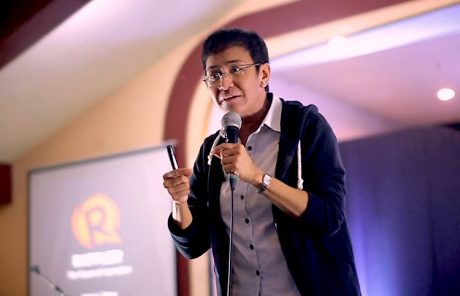
Maria Ressa, CEO of “social news site” Rappler has gone too far. Rather than own up to her failure to build a credible news media organisation that could compete in the free market of ideas, she, instead, takes it upon herself to appoint Facebook as “the new gatekeeper to information” and then proceed to accuse the social media giant for failing to “moderate its greed” and step up to that role.
MSNBC has become the latest Western media organisation to air Ressa’s monumental tantrum over how social media is conspiring against the “goodness” of Rappler and everything she stands for. It has backward-engineered a story from Ressa’s dubious premise and populated it with the usual cast of villains: armies of “bots” and paid “trolls” producing and propagating “fake news” commanded by an “authoritarian” leader. It is an all-too-familiar and overused plot of late — perhaps the only narrative in the dwindling ideological arsenal of the Philippine Opposition. But the same message delivered by a Western media outlet makes that message far more potent to Filipinos thanks to their renowned colonial mentality.
Ressa and her cohorts in MSNBC would like people to believe that Facebook heralded the dawn of mass hypnosis in aid of political agendas. They accuse Faceook of, of all things, “undermining democracy”. What they fail to note is that this has long been a practice by mainstream media long before Facebook was even a twinkle in Mark Zuckerberg’s eye. Back in 1998, Singapore Prime Minister Lee Kuan Yew already cited the role media played in undermining democracy.
According to Lee, “a wieldy partisan press helped Filipino politicians to flood the market place of ideas with junk”. Apparently, the Philippine press before Martial Law enjoyed all the freedom but failed the Filipino people. Lee added that the Philippine press “confused and befuddled the Filipino people so they could not see what their vital interests were in a developing country. And because basic issues like economic growth and equitable distribution was seldom discussed and were not tackled, the democratic system malfunctioned.”
In short, Ressa and that MSNBC bozo in that video are wrong and Mark Zuckerberg is right. Facebook is just a platform upon which any kind of information — including “fake news” — is easily spread. Indeed, Facebook is democracy in its purest form because on Facebook, what is popular wins. Mainstream media, on the other hand, is not a platform in the same sense that Facebook is. Mainstream media content is produced and priortised by human editors. At their heyday, mainstream news media editors and publishers were amongst the most powerful men and women in the world because of this responsibility. Human editors then and now in mainstream media arbitrarily decided — on the basis of their personal judgement — what is and what isn’t news. In contrast, Facebook only uses a disinterested machine — its much misunderstood (and, thus, feared) newsfeed algorithm to vet what is relevant to its users.
In short, the human editors-in-chief of the New York Times and the Inquirer are directly accountable for what appears in their publications’ front pages. Zuckerberg, on the other hand, cannot be held directly accountable for what appears on our Facebook newsfeeds. It is we who are accountable for what appears on our Facebook newsfeeds — because what appears on our newsfeeds is based on what we “Like” and “Share”.
The short of it is that Facebook is not to blame for the spread of “fake news” because it is the producers of fake news and the users who spread it by thoughtlessly clicking on the “Like” and “Share” buttons who are really to blame for its spread.
The trouble with Liberals like Ressa and the mainstream media of the United States and that of the Philippines is that rather than blame the weak character of the average Facebook user for the spread of disinformation, they’d rather blame Facebook itself. That’s like blaming the hammer for the shoddy work of the carpenter who wields it.
Philippine President Rodrigo Duterte did not win because of social media “bots” and “trolls” spreading “fake news”. He continues to enjoy a high approval rating after almost two years in power, something that would have been impossible to achieve if he had been governing on a platform of lies. Filipinos should be given a bit more credit. They would have seen through a government of lies within months of its ascent to power.
We can also thank the Philippine Opposition itself for being focused on taking ineffectual low-level tactical potshots against Duterte’s government and, over that same period since the May 2016 elections, utterly failing to present a coherent alternative strategic path to Duterte’s. For a democracy to work, there needs to be a competent Opposition. Unfortunately, the Philippine Opposition has yet to purge its ranks of its Liberal Party infestation which continues to hobble it with its obsolete 1980s-vintage victim mentality and hero-worship ideology.
Maria Ressa needs to face the truth about her predicament and her failure to lead Rappler to success. Facebook did not cause Rappler to fail and did not cause Duterte to win. In a free market, users and eyeballs who are free to visit — and leave — websites determine which sites win and lose. And, in a democracy, voters determine who wins and loses. It’s really that simple. There are no conspiracies here. Only crybabies.

No comments:
Post a Comment